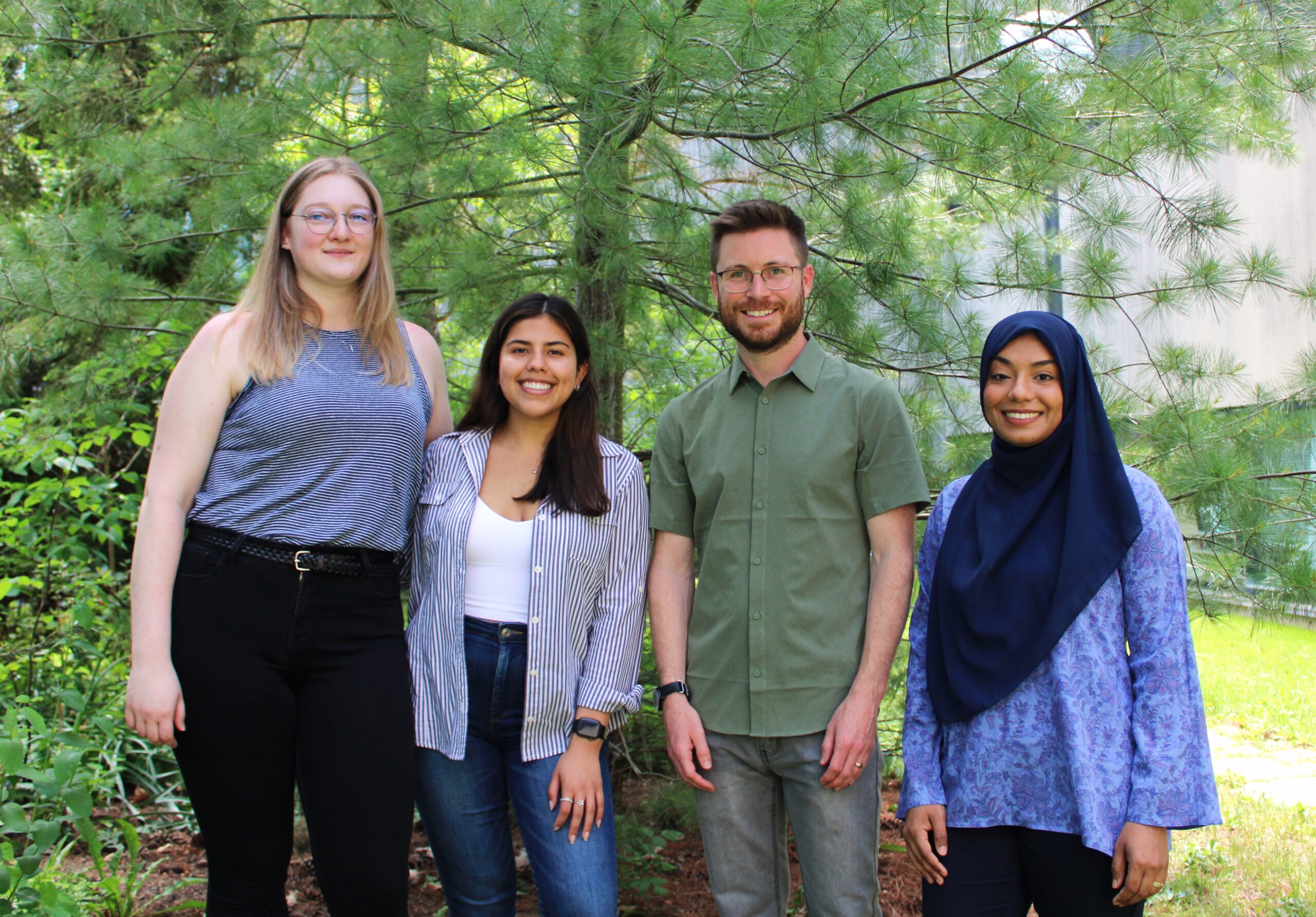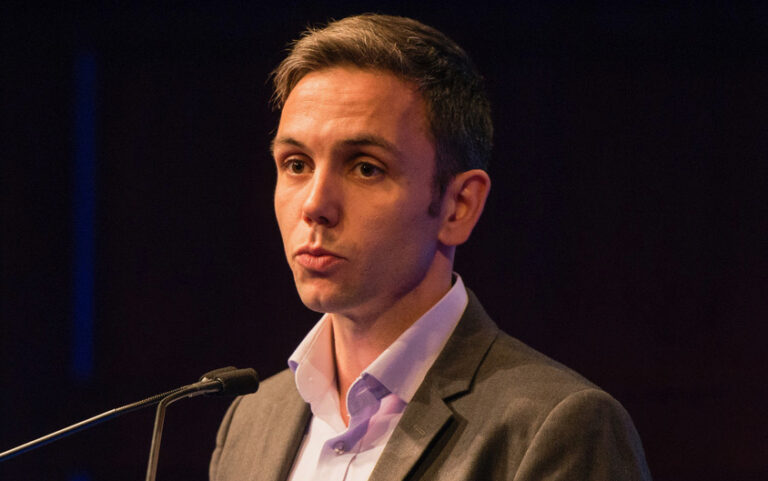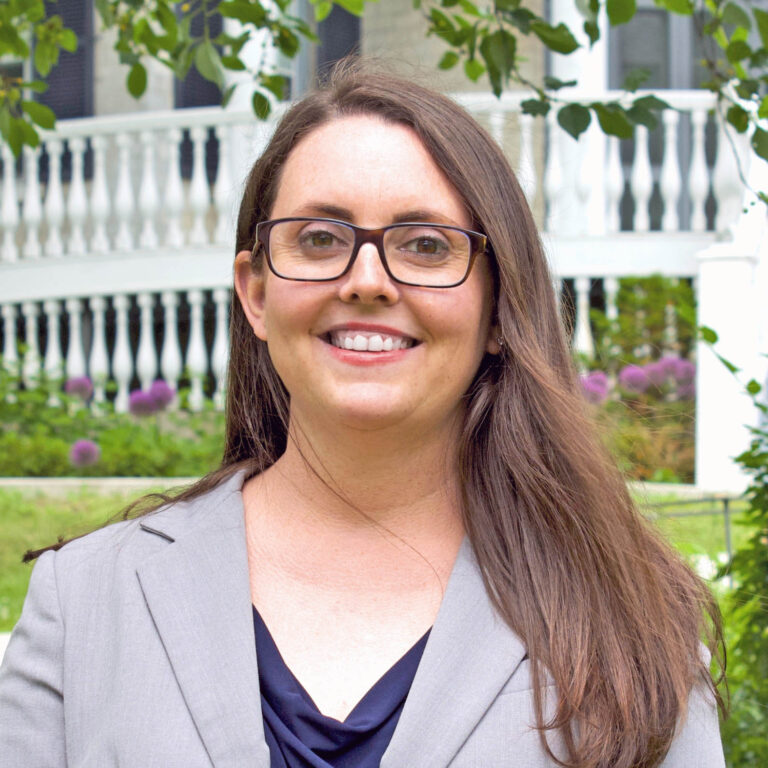2022 Discovery Award Winners
The Banting Research Foundation is pleased to announce Discovery Award winners for 2022.
Climate Change and Health: Spotlight

Edward Ian Patterson, PhD
Exploiting insect-specific viruses to prevent transmission of arthropod-borne viruses

Mihai Duduta, PhD
Smart micro-catheters based on electro-mechanical artificial muscles

Silvia Pozzi, PhD
Unraveling the role of PPIA/EMMPRIN pathway in the communication between Schwann cells and motor neurons in ALS

Kimberly Dunham-Snary, PhD
Mitochondrial-metabolomic fingerprinting in cardiometabolic disease

Amy Huei-Yi Lee, PhD
Integrated omics and functional analyses to expand the repertoire of surveillance and drug targets in Pseudomonas aeruginosa

Luka Milosevic, PhD
Physiologically-informed and data-driven methods for advancing neuromodulation therapies in dystonia
Scroll to read our awardee's research bio
Climate Change and Health: Spotlight
Exploiting insect-specific viruses to prevent transmission of arthropod-borne viruses
Recipient of the Banting Discovery Award – Jarislowsky Fellowship

Edward Ian Patterson, PhD (Charles Sturt University)
Assistant Professor, Department of Biological Sciences, Faculty of Mathematics and Science, Brock University
My research has climate change and human health implications. We use mosquitoes that are invasive in Canada, which have only been seen here in the last few years. The mosquitoes will become more established in Canada with climate change, and we will have longer transmission seasons as well. These particular mosquitoes are capable of transmitting many viruses (that they may bring with them or pick up from someone that has recently travelled), including viruses that aren’t currently in Canada but may be soon, due to climate change.
Professor Patterson’s team examines how these viruses are transmitted, and how to use harmless viruses to prevent the spread of dangerous pathogens.
Surveillance of mosquitoes to identify viruses has uncovered many insect-specific viruses (ISVs) that only infect insects. It has been theorized that ISVs could be deployed in mosquitoes for pathogen control.
The results will produce a novel, modifiable platform that can inhibit many arthropod-borne pathogens.

Patterson’s team from L to R: Irene Brundula, BSc, Anneliese von Eicken, MSc student, Dr. Ian Patterson, Assmaa El Khal, MSc student.
Smart micro-catheters based on electro-mechanical artificial muscles
Recipient of the University of Toronto 100th Anniversary Discovery of Insulin Banting Award

Mihai Duduta, PhD (Harvard)
Assistant Professor, Department of Mechanical Engineering, Faculty of Applied Science & Engineering, University of Toronto
Professor Duduta’s team is working to develop solutions to unmet needs with soft robotics, including sensate prosthetics, mechano-therapy, artificial limbs, and endovascualr intervention tools. Smart micro-catheters address a significant clinical need: long endo-vascular interventions because of slow navigation through tortuous anatomy.
With the device, and in collaboration with clinicians, the team will test a medical hypothesis: that the duration of an endovascular intervention can be reduced significantly if the clinician can steer the micro-catheter to navigate sharp turns. The team has also developed a novel fabrication method.
This project will produce a novel steerable catheter and demonstrate functionality in a tortuous anatomy phantom model. The device and performance in relevant anatomy will be used to engage clinicians and apply for additional funding for in vivo testing.

Duduta’s team from L to R: Nour Dowedar, MASc student, Masoud Moghani, PhD student, Dr. Mihai “Mishu” Duduta, Dhruvi Parekh, MASc student, Haleh Shahsa, PhD student, Ang Li, MASc student, Siyoung Lee, Postdoctoral Fellow.
Unraveling the role of PPIA/EMMPRIN pathway in the communication between Schwann cells and motor neurons in ALSU
Recipient of the Banting Discovery Award – Jarislowsky Fellowship

Silvia Pozzi, PhD (Open University of London)
Assistant Professor, Department of Psychiatry and Neuroscience, Faculty of Medicine, Université Laval
Professor Pozzi’s motivation is to find a cure for Amyotrophic lateral sclerosis (ALS) – a fatal neurodegenerative disease characterized by motor neuron degeneration.
The proposed research project aims to unravel the roles and interaction in the communication between a chaperone protein and its interaction with its receptor pathway, in the communication between Schwann cells and motor neurons ALS.
The project aims to produce steppingstone observations that will contribute to the understanding of the peripheral degeneration in the ALS pathology, unravel a new pathway of communication, and a possible peripheral therapeutic target for ALS.

Pozzi’s team from L to R: Marion Boyer, MSc student, Dr. Silvia Pozzi, Gloria Nwamaka Edozie MSc student.
Mitochondrial-metabolomic fingerprinting in cardiometabolic disease
Recipient of the Mitacs-Banting Discovery Award

Kimberly Dunham-Snary, PhD, (U of Alabama at Birmingham)
Assistant Professor, Department of Medicine, Faculty of Health Sciences, Queen’s University. Tier II Canada Research Chair
Cardiometabolic diseases (CMDs) are the leading cause of death globally, and incidence is increasing worldwide. Diet, exercise, and medications do not adequately address underlying genetic and biomolecular factors associated with CMDs.
Mitochondria are responsible for converting food to energy and play a key role in CMDs via unclear mechanisms. My objectives are to combine mitochondrial genetics, dynamics and proliferation signaling to elucidate disease mechanisms and biomarkers of CMDs.
This award will help generate robust preliminary data in vivo, which will strengthen future funding submissions aimed at a translational mitochondrial-metabolomic fingerprint of CMDs.
Professor Dunham-Snary dedicates this Mitacs-Banting Discovery Award to the memory of David G. Westbrook Jr, a fellow research scientist and former colleague whose life was cut short by a senseless act of gun violence in Birmingham, AL, on May 23, 2022.

Dunham-Snary’s team from L to R: Dalia Miller, UG student, Dr. Kimberly Dunham-Snary, Mia Wilkinson, MSc student, Samsara Boots, UG research technician, Abhishek Shastry, MSc student.
Integrated omics and functional analyses to expand the repertoire of surveillance and drug targets in Pseudomonas aeruginosa
Recipient of the Banting Discovery Award

Amy Huei-Yi Lee, PhD (Simon Fraser University)
Assistant Professor, Department of Molecular Biology & Biochemistry (MBB), Faculty of Science, Simon Fraser University
Pseudomonas aeruginosa (Pae) causes significant disease burden to cystic fibrosis (CF) individuals and are highly antimicrobial resistant.
Using comparative genomics, we identified several uncharacterized proteins that alter Pae virulence.
Our integrated approach will provide functional characterization of hypothetical proteins important to virulence, resistance, and CF disease outcome, ultimately critical to develop anti-virulence drugs.

Lee’s team from L to R: Kevin Luong Ning, graduate student, Camila Maurmann, visiting PhD student from Brazil. Dr. Amy Lee, Negin Ketabchi, UG research assistant, Zukhro Pulatova. UG research assistant, Pat Taylor, postdoctoral fellow. Not shown in the photo: Erica Acton (maternity leave) senior bioinformatician, and Mahta Amanian, UG research assistant.
Physiologically-informed and data-driven methods for advancing neuromodulation therapies in dystonia
Recipient of the Banting-Dystonia Medical Research Discovery Award

Luka Milosevic, PhD (University of Toronto)
Clinical and Computational Neuroscience, Krembill Research Institute, University Health Network; Assistant Professor, Institute of Biomedical Engineering, University of Toronto.
Professor Milosevic’s work on brain disorders – combined with the rapidly growing field of neurotechnology, impacts new devices to alter brain activity and new therapies that can be applied to restore neurocircuit function in various disorders, like dystonia – a neurological disorder characterized by involuntary muscle contractions, repetitive movements, and abnormal fixed postures.
Deep brain stimulation (DBS) is a remarkable therapy for dystonia, however the current implementation involves delivery stimulation 24 hours per day. Physiologically-informed DBS would instead deliver stimulation only when necessary based on brain signals associated with disease symptoms, thereby reducing side effects and improving quality of life.
His team develops diagnostic models to identify brain biomarkers associated with dystonia, using these signals to design new forms of DBS for better treatment of dystonia for individuals living with the burden of neurological disease.

Milosevic’s team from L to R: Dr. Luka Milosevic, Leon Steiner, postdoctoral fellow, Kiah Spencer, MASc student, David Crompton, MSc student, Cindy Nguyen, MSc student, Srdjan Sumarac, PhD student, Max Scherer, postdoctoral fellow, and Samantha Chau, UG student.
